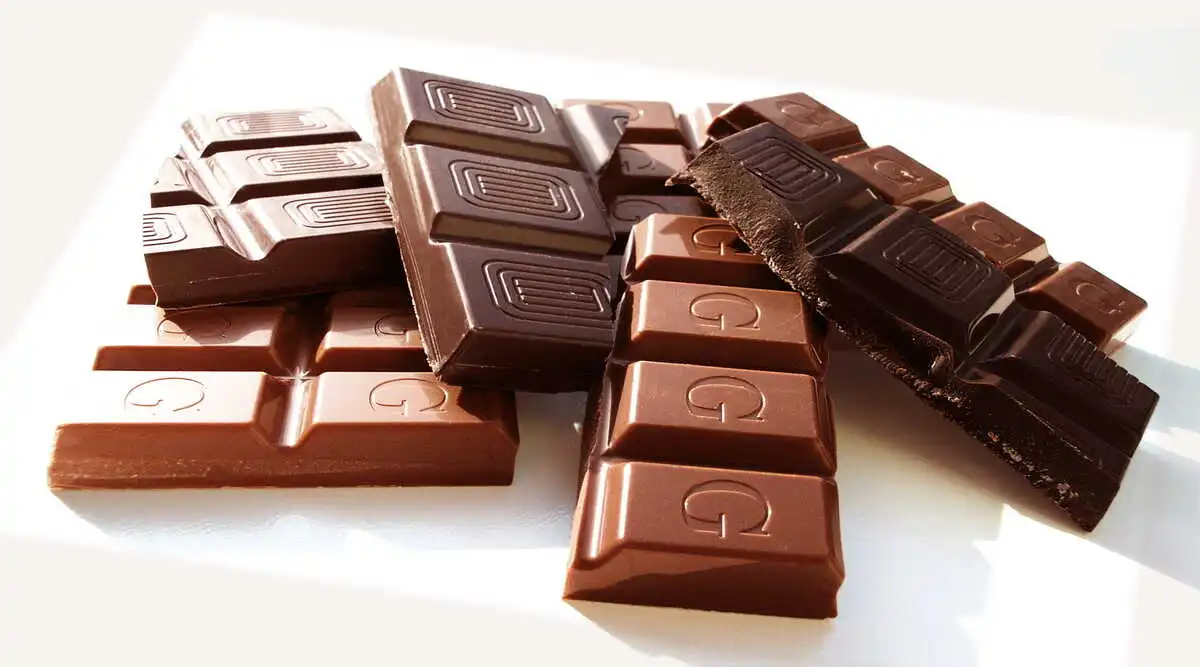It can be pointed out that the hiatal hernia is a disease produced when a part of the stomach protrudes through the diaphragm, specifically in a trajectory towards the chest, which generates painful discomfort and is associated with symptoms of heartburn and gastric reflux.
In this sense, what causes this disease is related to the weakness in the muscles and tissues around and inside the “diaphragmatic hiatus”, which is part of the anatomical barrier that separates the esophagus from the stomach.
When you have a disease like this, it is necessary to carry out a specific treatment or plan a corresponding surgery.
Regardless of the option selected under the medical advise, the patient’s eating habits must be changed.
So, when a hernia correction surgery take place, it would imply following dietary recommendations and avoiding certain foods afterwards that contain fat and other substances such as chocolate.
In this regard, it is normal to wonder if you can eat chocolate after undergoing a surgical procedure of this nature. Therefore, this article will answer this question, as well as explain relevant aspects of this topic.
Why no chocolate after hiatal hernia surgery?
Contrary to the fact that there are no scientifically proven and validated studies that prohibit eating chocolate after a hiatus hernia surgical procedure, it is advisable to avoid the consumption of chocolate since it contains significant levels of fat and caffeine.
Therefore, it can generate heartburn, gastric reflux or general discomfort in the digestive system. Consequently, there are some doctors who recommend avoiding chocolate after this type of surgery, in order to prevent any symptoms associated with it that may delay the patient’s recovery.
Besides, there is a low percentage of doctors, which allows patients to eat chocolate, but with “strict moderation” after this medical procedure.
It is necessary to consult your physician about any concerns or specific restrictions related to your diet after this surgical process.
Consequences of eating chocolate after hiatal hernia surgery
It is relevant to note that consuming chocolate precisely after hiatal hernia surgery can generate consequences for some people, among which the following aspects can be described:
Acid reflux
In particular, chocolate can become a common trigger for acid reflux, which can worsen symptoms of heartburn, acid reflux, and chest pain after hiatal hernia surgery.
So, it’s important to avoid any food that can trigger acid reflux. Let’s look at what can kind of food you should eat and which ones you should avoid.
Stomach ache
The fat and caffeine content of chocolate can upset the stomach in some people after hiatal hernia surgery.
Delayed recovery
Consider if the intake of chocolate causes unfavorable digestive symptoms, it can delay the recovery of the patient.
What does chocolate have that can harm you after hiatal hernia surgery?
It is inferred that chocolate contains some components that can cause stomach ache and worsen the symptoms of heartburn and acid reflux after a hiatal hernia surgical process. These substances are described below:
Lipids or Fats
It is convenient to clarify that chocolate also contains lipids, which can maximize the production of acid in the stomach and worsen the symptoms of heartburn and acid reflux. Similarly, they can slow down digestion and increase pressure in the stomach, which can lead to acid reflux.
Caffeine
Likewise, chocolate contains caffeine, which is proven by the scientific community to stimulate the production of acid in the stomach and worsen the symptoms of heartburn and acid reflux.
Sugar
Chocolate can also contain high levels of sugar, which can trigger an inflammatory response in the body and worsen heartburn and acid reflux symptoms.
Theobromine
It should be noted that chocolate contains an active ingredient called “theobromine”, which is a compound similar to caffeine that can also stimulate the production of acid in the stomach and cause stomach ache.
In general terms, all the components described above can worsen the symptoms of heartburn and acid reflux after a hiatal hernia operation, which can generate adverse consequences in the patient’s recovery.
What should I eat after hiatal hernia surgery?
It is recommended to follow a soft and low-fat diet during the first weeks. Among the foods that you can consume include:
Fresh fruits and vegetables
Soft, cooked (fresh) fruits and vegetables such as: apples, bananas, pears, pumpkins, carrots and peas. they are easy to digest and provide the body with fiber and basic nutrients important for the recovery process.
Lean protein
Lean meats such as chicken, turkey, fish, eggs, and beans are excellent sources of protein and are great for digestion.
Cereals and whole grains
Brown rice, whole wheat pasta, whole wheat bread and whole grain cereals, which are low in fat, are healthy sources of carbohydrates and fiber that are important for the body.
Low fat dairy
Dairy products, in which you can specify: skimmed milk, yogurt, and low-fat cheeses. They are good sources of calcium and protein. However, you should consider that some patients may present lactose intolerance after the surgery process.
On the other hand, it is essential to avoid spicy, fried, greasy, citrus foods, caffeine and alcohol because they can worsen the symptoms of heartburn and reflux.
At the same time, it is important to eat small, frequent meals, as well as to chew food well for better digestion and avoid pressure on the stomach.
It is appropriate to consult with a doctor or nutritionist for specific recommendations on the diet after hiatal hernia surgery.
What kind of follow-up care will I need after hiatal hernia surgery?
It is important to mention that after a hiatus hernia surgery process, follow-up and prophylactic control are required so that the recovery process is optimal, as well as to prevent long-term complications for the patient.
In the same order of ideas, the follow-up will depend on several factors, both the type of surgery that has been performed and the general health condition.
Here are some considerations:
- Control and follow-up appointments: Control and follow-up appointments will be scheduled with your doctor, in order to verify the progress of recovery and evaluate any possible complications.
- Diet changes: You may need to temporarily change your diet after hiatal hernia surgery. In that particular, a qualified nutritionist can plan an adequate and balanced diet that helps you in recovery process.
- Physical activity: Your doctor can provide recommendations for when you can start exercising again and what types of physical activities you can engage in. It is important to avoid heavy lifting and activities that put pressure on the abdominal area.
- Medications: You may need to take medications to prevent infection or to help reduce pain and swelling after surgery. Put simply, you should follow your doctor’s instructions.
- Appropriate wound care: You may need to care for the wound and change bandages, as expressly recommended by your doctor.
How can I manage my symptoms after hiatal hernia surgery?
You should keep in mind that after this surgical process, you may experience some symptoms, such as: abdominal pain, nausea, vomiting, heartburn and difficulty when swallowing.
Here are some ways to manage these symptoms:
Take medications as prescribed
Your doctor will likely prescribe medication for pain and swelling after surgery, so follow the instructions accordingly.
Have a soft diet
Your doctor may recommend a bland diet after surgery to help your body heal and prevent stomach irritation. Therefore, fatty, spicy, acidic and any food that are difficult to digest should be avoided.
Eating small, frequent meals
Eating meals in small portions throughout the day, which helps reduce pressure on the stomach and prevent heartburn.
Avoid lying down after eating
It is important, after eating, to wait at least 2 to 3 hours before going to bed, in order to avoid heartburn.
Avoid lifting heavy objects
It is necessary to avoid lifting heavy objects with the purpose to prevent tension in the abdomen.
Perform low-impact physical activity
The doctor may recommend a small routine of light exercises such as walking, which helps the body recover.
Follow the doctor’s instructions
You must follow your doctor’s instructions regarding when you can return to your normal life (work, normal activities).
In the case of presenting any unusual symptoms or having questions regarding how to manage the symptoms after a surgical process of this type, it is necessary to consult with your physician.
Frequently asked questions
Absolutely not, as eating chocolate does not cause a hiatal hernia. Along those lines, consider that a hiatal hernia is caused when a part of the stomach pushes up and sits on the diaphragm, the muscle that separates the chest from the abdomen. However, some foods can make the symptoms of a hiatal hernia worse.
Before the surgical process of a hiatal hernia, the doctor may recommend that you avoid or limit the consumption of foods that can irritate the stomach or worsen the symptoms of the hiatal hernia.
In this particular, chocolate can increase the production of acid in the stomach and aggravate heartburn. Therefore, it is advisable to limit its consumption before surgery.
Of course, it is possible that chocolate could trigger acid reflux symptoms after hiatal hernia surgery, as it is one of the foods known to worsen hiatal hernia and acid reflux symptoms.
It should be kept in mind that hiatal hernia surgery is designed to reduce or eliminate the symptoms of acid reflux. However, after surgery, you may still have some symptoms of acid reflux such as: heartburn, nausea, chest pain, or trouble swallowing.
Overall, dark chocolate is a better choice than milk chocolate for people with hiatal hernias as it is lower in fat and sugar.
However, you should consume it in strict moderation. It should be considered that this type of chocolate contains antioxidants and other nutrients that may have some health benefits such as improving cardiovascular function and reducing inflammation.
Naturally, it is important to discuss your chocolate consumption habits before and after surgery with your doctor, as he or she can point out specific recommendations on which foods to avoid or limit before and after surgery to help ensure a successful recovery.
Conclusion
It is definitely not recommended to eat chocolate after hiatal hernia surgery as it contains significant levels of lipids and caffeine.
In such a way, that if you eat chocolate, you can risk your health, and present heartburn, gastric reflux or general discomfort in the digestive system, causing delays in the patient’s recovery.
It is important to clarify that chocolate contains components that can harmful for your stomach and can worsen post-surgery symptoms. These substances are the following:
- Lipids or Fats.
- Caffeine.
- Sugar.
- Theobromine.
When this type of surgical procedure is performed, it is recommended to follow a soft and low-fat diet during the first weeks as well as to consume the following foods:
- Fresh fruits and vegetables,
- Lean protein.
- Cereals and whole grains.
- Low-fat dairy (skimmed or skimmed).
It is necessary to avoid foods that are: spicy, fried, greasy, citrus fruits caffeine and alcohol, because they can increase the symptoms of heartburn and reflux.
In addition, it is important to take into account some considerations after hiatal hernia surgery, among which we can mention:
- Make appointments for control and corresponding medical follow-up.
- Make changes in the diet.
- Carry out moderate physical activity according to medical indications.
- Compliance with the pharmacological and procedural treatment plan.
- Carry out the corresponding care and bandage changes.
Finally, every surgical process leads to the use of pertinent care. In this sense, if there is a concern or doubt about what we have discussed in this article, you should not hesitate and contact your doctor.

A. Neomar Evies es un profesor graduado y licenciado en informática. Investigador y conferencista que ha participado en diferentes eventos en diversos países. Tiene amplia experiencia en el campo de la gestión deportiva y el deporte de alto rendimiento y salud deportiva del atleta. También tiene un doctorado en Ciencias del Deporte y un Máster en administración. Como escritor ha escrito tres libros sobre sistemas de información centrados en Gestión y Deportes.





